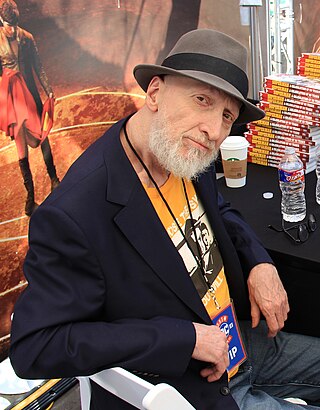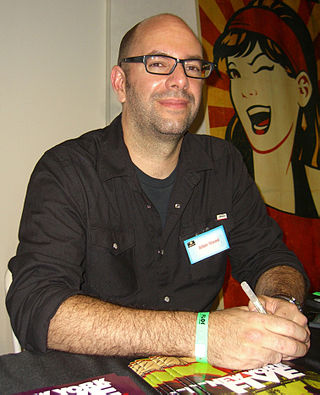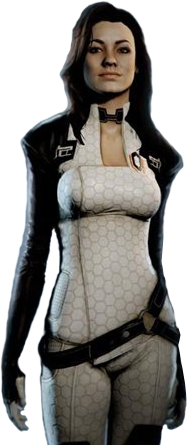
Frank Miller is an American comic book artist, comic book writer, and screenwriter known for his comic book stories and graphic novels such as his run on Daredevil, for which he created the character Elektra, and subsequent Daredevil: Born Again, The Dark Knight Returns, Batman: Year One, Sin City, and 300.

Garth Ennis is a Northern Irish-American comics writer, best known for the Vertigo series Preacher with artist Steve Dillon, his nine-year run on Marvel Comics' Punisher franchise, and The Boys with artist Darick Robertson. He has collaborated with artists such as Dillon and Glenn Fabry on Preacher, John McCrea on Hitman, Marc Silvestri on The Darkness, and Carlos Ezquerra on both Preacher and Hitman. His work has won him recognition in the comics industry, including nominations for the Comics Buyer's Guide Award for Favorite Writer in 1997, 1998, 1999, and 2000.
Guy Davis is an American creature designer, concept artist, illustrator and storyboard artist who has worked on film, television, comic book and video game projects. He is known for his collaborations with filmmaker Guillermo del Toro, including the television series The Strain (2014–17) and the films Pacific Rim (2013), Crimson Peak (2015) and The Shape of Water (2017). Beforehand, Davis was the regular artist for the Hellboy spinoff comic B.P.R.D. (2003–2010), as well as the artist behind his own creator-owned comic The Marquis (2009).

Paul Jenkins is a British comic book writer, screenwriter, novelist, and narrative director. He has had much success crossing over into the American comic book market. Primarily working for Marvel Comics, Jenkins had a big part shaping the characters of the company, helping via the Marvel Knights imprint to propel Marvel from Chapter 11 bankruptcy before choosing to focus on independent publications. He is also noted for his groundbreaking narrative work in the field of video games, and is recognized as one of the world's preeminent "cross-media" creators for his work across such multiple media as animation, video games, comic books, and film.

Brian Wood is an American writer, illustrator, and graphic designer, known for his work in comic books, television and video games. His noted comic book work includes the series DMZ, Demo, Northlanders, The Massive, Marvel Comics' The X-Men, and Star Wars. His web series work includes adaptations of his own short stories from the comics series The Massive and Conan the Barbarian for Geek & Sundry and YouTube, and his video game work includes three years on staff at Rockstar Games, co-writing 1979 Revolution: Black Friday and story contributions to Aliens: Fireteam Elite. His television work includes pilot scripts for AMC, Amazon Studios, and Sonar Entertainment. He is a contributing writer on HBO Max's DMZ adaptation of his own work.

Jo Chen is an American comic book artist and writer best known for her highly detailed painted comic book covers. In the Japanese comic industry she is also known by the pen name TogaQ and is known as Jun Togai.

Scott Snyder is an American comic book author. He is known for his 2006 short story collection Voodoo Heart, and his work for DC Comics, including series such as American Vampire, Detective Comics, a highly acclaimed run on Batman, Swamp Thing, and Justice League as well as the company-wide crossover storylines "Dark Nights: Metal" and "Dark Nights: Death Metal." He has also written creator-owned comics published through Image Comics, including Wytches, Undiscovered Country, and Nocterra.

The Umbrella Academy is an American comic book series created and written by Gerard Way and illustrated by Gabriel Bá. The first six-issue limited series, The Umbrella Academy: Apocalypse Suite, was released by Dark Horse Comics between September 14, 2007, and February 20, 2008. It won the 2007 Eisner Award for Best Finite Series/Limited Series. A second series, The Umbrella Academy: Dallas, followed in 2008. After a hiatus the series returned in 2018 with The Umbrella Academy: Hotel Oblivion released between October 3, 2018, and June 12, 2019.

Xena: Warrior Princess is a series of comic books based on the television series of the same name. Topps Comics and Dark Horse Comics created a series of comics tying into the property. In 2007, Dynamite Entertainment acquired the rights to the series.
Mark Schultz is an American writer and illustrator of books and comics. His most widely recognized work is the creator-owned comic book series Xenozoic Tales, which describes a post-apocalyptic world where dinosaurs and other prehistoric creatures coexist with humans. In 1993, Xenozoic Tales was adapted into an animated series titled Cadillacs and Dinosaurs and a video game of the same name. Schultz's other notable works include various Aliens comic book mini-series published by Dark Horse and a four-year run on the DC Comics series Superman: The Man of Steel. In 2004, Schultz took over the scripting duties of the Prince Valiant comic strip.
Mass Effect is a military science fiction media franchise created by Casey Hudson. The franchise depicts a distant future where humanity and several alien civilizations have colonized the galaxy using technology left behind by advanced precursor civilizations.

Jeff Lemire is a Canadian comic book writer, artist, and television producer. He is the author of critically acclaimed titles including the Essex County Trilogy, Sweet Tooth, and The Nobody. His written work includes All-New Hawkeye, Extraordinary X-Men, Moon Knight and Old Man Logan for Marvel; Superboy, Animal Man, Justice League Dark, and Green Arrow for DC; Black Hammer and Mazebook for Dark Horse; Descender and Gideon Falls for Image Comics; and Bloodshot Reborn for Valiant.

Mass Effect: Redemption is a four-part comic book mini-series. Set in the Mass Effect universe, Redemption takes place two years before the events of the video game Mass Effect 2.

Miranda Lawson is a fictional character in the role-playing video game series Mass Effect by BioWare. In it, Miranda is an officer of the pro-human group Cerberus, first appearing in the 2009 iOS game Mass Effect Galaxy, and then serving as a squad mate in Mass Effect 2. In addition to these, the character also makes an appearance in the Mass Effect: Redemption comic series, in Mass Effect 3 if she survived the events of the suicide mission in Mass Effect 2, and in issues 5, 6, 8 and 9 of the Mass Effect: Foundation comic series. She is revealed to have been genetically designed by her father, Henry Lawson, to be perfect, and ran away from home to join Cerberus.

The Illusive Man is a fictional character in BioWare's Mass Effect video game franchise. He is the leader of the pro-human group Cerberus. The Illusive Man wears an open suit that connotes both futuristic style and the "casual swagger of a charming billionaire". His eye implants make him appear slightly inhuman. He is normally seen in an empty office with no indication of his living arrangements. He is voiced by Martin Sheen.

Jack is a fictional character in the role-playing video game series Mass Effect by BioWare. Jack appears as a squadmate in Mass Effect 2, and may appear in Mass Effect 3 as a supporting character provided she survives the events of the previous game. Jack is voiced by Courtenay Taylor. Within the series, Jack was orphaned at an early age and was kidnapped by the anthropocentric paramilitary group Cerberus to be exploited as a test subject. Designated Subject Zero by Cerberus, she is considered to be one of the most powerful human biotics in existence in the Mass Effect trilogy as the result of unethical experiments conducted by Cerberus to enhance human biotic ability, though her traumatic experiences have molded her into an antisocial and psychopathic individual.
The Witcher is a comic book series that has been published by the American publisher Dark Horse Comics since 2014. It is based on The Witcher media franchise of CD Projekt.












